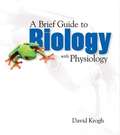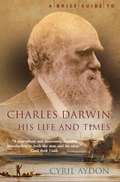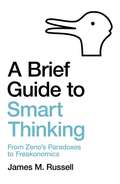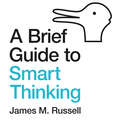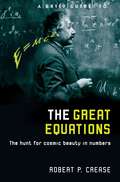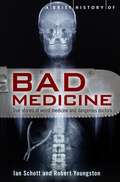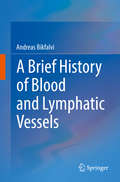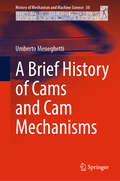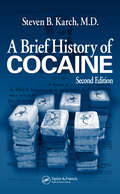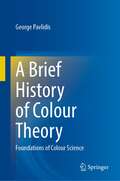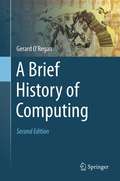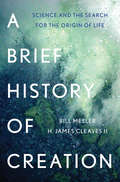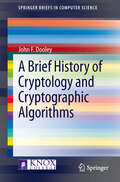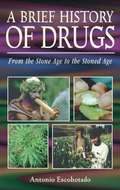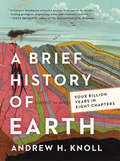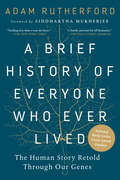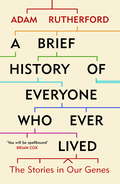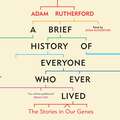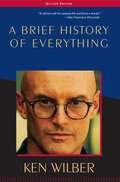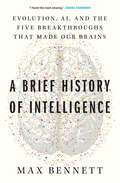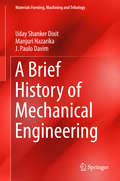- Table View
- List View
A Brief Guide to Biology with Physiology
by David KroghThis book focuses on the core topics of biology with a friendly writing style and vivid illustrations while exploring current "real world" issues. A seven-part organization covers atoms, molecules, and cells; energy and life; genetics; evolution and the diversity of life; human anatomy and physiology; and plant anatomy and physiology. For anyone interested in increasing their biological literacy - enabling them to make informed decisions at the ballot box and understand the research findings they see in the news.
A Brief Guide to Charles Darwin
by Cyril AydonCharles Darwin has become one of the most important men in history. The quiet, unsure polymath who avoided confrontation, ensconced in his family home at Down House in Kent, was also a revolutionary who developed his idea of Natural Selection in isolation. Cyril Aydon's short biography is considered one of the best introductions to the life and ideas of Darwin.With Darwin's legacy still in contention and the forthcoming anniversary of the publication of The Origins Species, Aydon's book is a perfect guide to the ideas as well as the man who was recently voted one of the greatest Britons of all time, and certainly one of the most influential thinkers ever.
A Brief Guide to Charles Darwin (Brief Histories)
by Cyril AydonCharles Darwin has become one of the most important men in history. The quiet, unsure polymath who avoided confrontation, ensconced in his family home at Down House in Kent, was also a revolutionary who developed his idea of Natural Selection in isolation. Cyril Aydon's short biography is considered one of the best introductions to the life and ideas of Darwin.With Darwin's legacy still in contention and the forthcoming anniversary of the publication of The Origins Species, Aydon's book is a perfect guide to the ideas as well as the man who was recently voted one of the greatest Britons of all time, and certainly one of the most influential thinkers ever.
A Brief Guide to Smart Thinking: From Zeno's Paradoxes to Freakonomics
by James M. RussellEach book is summarised to convey a brief idea of what each one has to offer the interested reader, while a 'Speed Read' for each book delivers a quick sense of what each book is like to read and a highly compressed summary of the main points of the book in question. The titles covered include thought-provoking classics on psychology, mindfulness, rationality, the brain, mathematical and economic thought and practical philosophy. The selection includes books about self-improvement as well as historically interesting accounts of how the mind works. Titles included go back as far as the Epictetus classic TheEnchiridion and Bertrand Russell's charming TheABC of Relativity, and proceed through classics such as Edward de Bono's Lateral Thinking and into the digital era with titles such as The Shallows and Big Data. The books are arranged chronologically, which draws attention to some of the interesting juxtapositions and connections between them. Some of the titles included are: Freakonomics, by Steven D. Levitt; Blink: The Power of Thinking Without Thinking, by Malcolm Gladwell; Sapiens: A Brief History of Humankind, by Yuval Noah Harari; The Organized Mind: Thinking Straight in the Age of Information Overload, by Daniel J. Levitin; The Descent of Man, by Grayson Perry; How the Mind Works, by Steven Pinker; Black Box Thinking: Why Some People Never Learn from Their Mistakes - But Some Do, by Matthew Syed; We Should All Be Feminists, by Chimamanda Ngozi Adichie; Guns, Germs, and Steel: The Fates of Human Societies, by Jared Diamond; The Black Swan: The Impact of the Highly Improbable, by Nassim Nicholas Taleb; Man's Search for Meaning, by Viktor E. Frankl; The News: A User's Manual, by Alain de Botton; Mindware: Tools for Smart Thinking, by Richard E. Nisbett; The ABC of Relativity, by Bertrand Russell; The Psychopath Test, by Jon Ronson; The Path: What Chinese Philosophers Can Teach Us About the Good Life, by Michael Puett; A Brief History of Time, by Stephen Hawking; Messy: The Power of Disorder to Transform Our Lives, by Tim Harford; Big Data: A Revolution That Will Transform How We Live, Work, and Think, by Viktor Mayer-Schönberger; Moneyball: The Art of Winning an Unfair Game, by Michael Lewis; The Survivors Club: The Secrets and Science That Could Save Your Life, by Ben Sherwood; Black Box Thinking, by Matthew Syed; Chaos: Making a New Science, by James Gleick; A Short History of Nearly Everything, by Bill Bryson; The Shallows: What the Internet Is Doing to Our Brains, by Nicholas Carr; Making Ideas Happen: Overcoming the Obstacles Between Vision and Reality, by Scott Belsky; The Enchiridion, by Epictetus; Gödel, Escher, Bach, by Douglas R. Hofstadter; What I Talk About When I Talk About Running, by Haruki Murakami; and Lateral Thinking, by Edward de Bono.
A Brief Guide to Smart Thinking: From Zeno's Paradoxes to Freakonomics
by James M. RussellEach book is summarised to convey a brief idea of what each one has to offer the interested reader, while a 'Speed Read' for each book delivers a quick sense of what each book is like to read and a highly compressed summary of the main points of the book in question. The titles covered include thought-provoking classics on psychology, mindfulness, rationality, the brain, mathematical and economic thought and practical philosophy. The selection includes books about self-improvement as well as historically interesting accounts of how the mind works. Titles included go back as far as the Epictetus classic The Enchiridion and Bertrand Russell's charming The ABC of Relativity, and proceed through classics such as Edward de Bono's Lateral Thinking and into the digital era with titles such as The Shallows and Big Data. The books are arranged chronologically, which draws attention to some of the interesting juxtapositions and connections between them. Some of the titles included are: Freakonomics, by Steven D. Levitt; Blink: The Power of Thinking Without Thinking, by Malcolm Gladwell; Sapiens: A Brief History of Humankind, by Yuval Noah Harari; The Organized Mind: Thinking Straight in the Age of Information Overload, by Daniel J. Levitin; The Descent of Man, by Grayson Perry; How the Mind Works, by Steven Pinker; Black Box Thinking: Why Some People Never Learn from Their Mistakes - But Some Do, by Matthew Syed; We Should All Be Feminists, by Chimamanda Ngozi Adichie; Guns, Germs, and Steel: The Fates of Human Societies, by Jared Diamond; The Black Swan: The Impact of the Highly Improbable, by Nassim Nicholas Taleb; Man's Search for Meaning, by Viktor E. Frankl; The News: A User's Manual, by Alain de Botton; Mindware: Tools for Smart Thinking, by Richard E. Nisbett; The ABC of Relativity, by Bertrand Russell; The Psychopath Test, by Jon Ronson; The Path: What Chinese Philosophers Can Teach Us About the Good Life, by Michael Puett; A Brief History of Time, by Stephen Hawking; Messy: The Power of Disorder to Transform Our Lives, by Tim Harford; Big Data: A Revolution That Will Transform How We Live, Work, and Think, by Viktor Mayer-Schönberger; Moneyball: The Art of Winning an Unfair Game, by Michael Lewis; The Survivors Club: The Secrets and Science That Could Save Your Life, by Ben Sherwood; Black Box Thinking, by Matthew Syed; Chaos: Making a New Science, by James Gleick; A Short History of Nearly Everything, by Bill Bryson; The Shallows: What the Internet Is Doing to Our Brains, by Nicholas Carr; Making Ideas Happen: Overcoming the Obstacles Between Vision and Reality, by Scott Belsky; The Enchiridion, by Epictetus; Gödel, Escher, Bach, by Douglas R. Hofstadter; What I Talk About When I Talk About Running, by Haruki Murakami; and Lateral Thinking, by Edward de Bono.
A Brief Guide to Smart Thinking: From Zeno’s Paradoxes to Freakonomics
by James M. RussellEach book is summarised to convey a brief idea of what each one has to offer the interested reader, while a 'Speed Read' for each book delivers a quick sense of what each book is like to read and a highly compressed summary of the main points of the book in question. The titles covered include thought-provoking classics on psychology, mindfulness, rationality, the brain, mathematical and economic thought and practical philosophy. The selection includes books about self-improvement as well as historically interesting accounts of how the mind works. Titles included go back as far as the Epictetus classic The Enchiridion and Bertrand Russell's charming The ABC of Relativity, and proceed through classics such as Edward de Bono's Lateral Thinking and into the digital era with titles such as The Shallows and Big Data. The books are arranged chronologically, which draws attention to some of the interesting juxtapositions and connections between them. Some of the titles included are: Freakonomics, by Steven D. Levitt; Blink: The Power of Thinking Without Thinking, by Malcolm Gladwell; Sapiens: A Brief History of Humankind, by Yuval Noah Harari; The Organized Mind: Thinking Straight in the Age of Information Overload, by Daniel J. Levitin; The Descent of Man, by Grayson Perry; How the Mind Works, by Steven Pinker; Black Box Thinking: Why Some People Never Learn from Their Mistakes - But Some Do, by Matthew Syed; We Should All Be Feminists, by Chimamanda Ngozi Adichie; Guns, Germs, and Steel: The Fates of Human Societies, by Jared Diamond; The Black Swan: The Impact of the Highly Improbable, by Nassim Nicholas Taleb; Man's Search for Meaning, by Viktor E. Frankl; The News: A User's Manual, by Alain de Botton; Mindware: Tools for Smart Thinking, by Richard E. Nisbett; The ABC of Relativity, by Bertrand Russell; The Psychopath Test, by Jon Ronson; The Path: What Chinese Philosophers Can Teach Us About the Good Life, by Michael Puett; A Brief History of Time, by Stephen Hawking; Messy: The Power of Disorder to Transform Our Lives, by Tim Harford; Big Data: A Revolution That Will Transform How We Live, Work, and Think, by Viktor Mayer-Schönberger; Moneyball: The Art of Winning an Unfair Game, by Michael Lewis; The Survivors Club: The Secrets and Science That Could Save Your Life, by Ben Sherwood; Black Box Thinking, by Matthew Syed; Chaos: Making a New Science, by James Gleick; A Short History of Nearly Everything, by Bill Bryson; The Shallows: What the Internet Is Doing to Our Brains, by Nicholas Carr; Making Ideas Happen: Overcoming the Obstacles Between Vision and Reality, by Scott Belsky; The Enchiridion, by Epictetus; Gödel, Escher, Bach, by Douglas R. Hofstadter; What I Talk About When I Talk About Running, by Haruki Murakami; and Lateral Thinking, by Edward de Bono.
A Brief Guide to the Great Equations: The Hunt for Cosmic Beauty in Numbers (Brief Histories)
by Robert CreaseHere are the stories of the ten most popular equations of all time as voted for by readers of Physics World, including - accessibly described here for the first time - the favourite equation of all, Euler's equation.Each is an equation that captures with beautiful simplicity what can only be described clumsily in words. Euler's equation [eip + 1 = 0] was described by respondents as 'the most profound mathematic statement ever written', 'uncanny and sublime', 'filled with cosmic beauty' and 'mind-blowing'. Collectively these equations also amount to the world's most concise and reliable body of knowledge.Many scientists and those with a mathematical bent have a soft spot for equations. This book explains both why these ten equations are so beautiful and significant, and the human stories behind them.
A Brief History of Bad Medicine (Brief Histories )
by Ian Schott Robert YoungstonA doctor removes the normal, healthy side of a patient's brain instead of the malignant tumor. A man whose leg is scheduled for amputation wakes up to find his healthy leg removed. These recent examples are part of a history of medical disasters and embarrassments as old as the profession itself.In Brief History of Bad Medicine, Robert M. Youngson and Ian Schott have written the definitive account of medical mishap in modern and not-so- modern times. From famous quacks to curious forms of sexual healing, from blunders with the brain to drugs worse than the diseases they are intended to treat, the book reveals shamefully dangerous doctors, human guinea pigs, and the legendary surgeon who was himself a craven morphine addict.Exploring the line between the comical and the tragic, the honest mistake and the intentional crime, Brief History of Bad Medicine illustrates once and for all that you can't always trust the people in white coats.
A Brief History of Bad Medicine (Brief Histories)
by Ian Schott Robert YoungstonA doctor removes the normal, healthy side of a patient's brain instead of the malignant tumor. A man whose leg is scheduled for amputation wakes up to find his healthy leg removed. These recent examples are part of a history of medical disasters and embarrassments as old as the profession itself.In Brief History of Bad Medicine, Robert M. Youngson and Ian Schott have written the definitive account of medical mishap in modern and not-so- modern times. From famous quacks to curious forms of sexual healing, from blunders with the brain to drugs worse than the diseases they are intended to treat, the book reveals shamefully dangerous doctors, human guinea pigs, and the legendary surgeon who was himself a craven morphine addict.Exploring the line between the comical and the tragic, the honest mistake and the intentional crime, Brief History of Bad Medicine illustrates once and for all that you can't always trust the people in white coats.
A Brief History of Blood and Lymphatic Vessels
by Andreas BikfalviThis book provides a comprehensive account of vascular biology and pathology and its significance for health and disease. It systematically and chronologically explains how we came to our current understanding of the vasculature and it´s function today, and describes in an entertaining way the diverse flaws and turns in science and medicine from the past. It thereby offers a complete and well-studied history on vascular biology and medicine. The book has an easy-to-read style and is written for students as well as scientists, physicians and lecturers in the field of biomedicine, human physiology, cardiology and hematology.
A Brief History of Cams and Cam Mechanisms (History of Mechanism and Machine Science #50)
by Umberto MeneghettiThis book offers a description of the evolution of cams and their uses from the Middle Ages to the present day, highlighting their contribution to the development of technology. Usually, in the history of technology the diverse types of machines are taken into account, but the importance of cams is not emphasized, which are often fundamental for the operation of such machines. In this book the focus is instead on cams, understood as important, and often essential, components of machines that have had significant importance in the development of technology. It treats technical aspects at a level easily accessible even to non-experts in mechanics and the various applications are illustrated with many figures. The book serves as a reference work for those interested in both the history of technology and machines in general, and it helps them deal with certain mechanical problems, even starting from solutions already obtained with cams and, perhaps, overcoming them with others suggested by current developments in technology.
A Brief History of Cocaine
by Steven B. Karch MD FFFLMA Brief History of Cocaine, Second Edition provides a fascinating historical insight into the reasons why cocaine use is increasing in popularity and why the rise of the cocaine trade is tightly linked with the rise of terrorism The author illustrates the challenges faced by today's governments and explains why current anti-drug efforts have had only a limited effect on this global market.This updated edition reexamines the impact of cocaine production, trade, and consumption on society beginning in the 16th century. It shows how the commercialization of cocaine was driven by cartels of Swiss and German pharmaceutical companies and private enterprises across Europe, Asia, and the United States. The author shows how government policies slowly transformed from trade, shipping, and manufacturing regulations, with little or no success in stemming the flow of drugs. The book describes how anti-drug laws, treaties, and costly initiatives involving crop substitution, crop suppression, interdiction, and international cooperation were first attempted more than 400 years ago and why these strategies failed for Colonial Spain and later backfired on the League of Nations. The author shows how economic necessity among growers, the environmental impact of pesticides, the potential for genetic engineering of coca plants, and other loopholes have actually been counterproductive, undermining the current efforts to curb the cocaine trade. Featuring new and reorganized chapters, A Brief History of Cocaine, Second Edition contains the latest data and statistics relating drug trafficking to terrorism, and explains recent trends in worldwide production, consumption, cost competition, and international transport. This book offers a well-rounded historical perspective that is ideal for criminal justice practitioners, teachers, students, and anyone interested in this topic.
A Brief History of Colour Theory: Foundations of Colour Science
by George PavlidisThis book offers a comprehensive introduction in to the various theories of colour and how they developed over the centuries and millennia. As colour is the perception of light by our brains, the book captures not only the physical phenomena but also psychological and philosophical aspects of colours. It starts with ancient studies of Greek philosophers and their insights into light and mirrors, then reviews the theory of colors in the middle ages in Europe and Middle East. The last big part of the book explains the theories of colours by modern scientists and philosophers, starting with Isaac Newton and ending colour schemes of modern digital pictures.
A Brief History of Computing
by Gerard O'ReganThis lively and fascinating text traces the key developments in computation - from 3000 B.C. to the present day - in an easy-to-follow and concise manner. Topics and features: ideal for self-study, offering many pedagogical features such as chapter-opening key topics, chapter introductions and summaries, exercises, and a glossary; presents detailed information on major figures in computing, such as Boole, Babbage, Shannon, Turing, Zuse and Von Neumann; reviews the history of software engineering and of programming languages, including syntax and semantics; discusses the progress of artificial intelligence, with extension to such key disciplines as philosophy, psychology, linguistics, neural networks and cybernetics; examines the impact on society of the introduction of the personal computer, the World Wide Web, and the development of mobile phone technology; follows the evolution of a number of major technology companies, including IBM, Microsoft and Apple.
A Brief History of Creation: Science and the Search for the Origin of Life
by Bill Mesler H. James Cleaves IIThe epic story of the scientists through the ages who have sought answers to life’s biggest mystery: How did it begin? In this essential and illuminating history of Western science, Bill Mesler and H. James Cleaves II seek to answer the most crucial question in science: How did life begin? They trace the trials and triumphs of the iconoclastic scientists who have sought to solve the mystery, from Darwin’s theory of evolution to Crick and Watson’s unveiling of DNA. This fascinating exploration not only examines the origin-of-life question, but also interrogates the very nature of scientific discovery and objectivity.
A Brief History of Cryptology and Cryptographic Algorithms (SpringerBriefs in Computer Science)
by John F. DooleyThe science of cryptology is made up of two halves. Cryptography is the study of how to create secure systems for communications. Cryptanalysis is the study of how to break those systems. The conflict between these two halves of cryptology is the story of secret writing. For over 2,000 years, the desire to communicate securely and secretly has resulted in the creation of numerous and increasingly complicated systems to protect one's messages. Yet for every system there is a cryptanalyst creating a new technique to break that system. With the advent of computers the cryptographer seems to finally have the upper hand. New mathematically based cryptographic algorithms that use computers for encryption and decryption are so secure that brute-force techniques seem to be the only way to break them - so far. This work traces the history of the conflict between cryptographer and cryptanalyst, explores in some depth the algorithms created to protect messages, and suggests where the field is going in the future.
A Brief History of Drugs: From the Stone Age to the Stoned Age
by Antonio EscohotadoThis fascinating book examines the instrumental role drugs have played in our cultural, social, and spiritual development from antiquity to the present.
A Brief History of Earth: Four Billion Years in Eight Chapters
by Andrew H. Knoll“A sublime chronicle of our planet." –Booklist, STARRED reviewA primer for every Earth resident, by Harvard’s acclaimed geologistHow well do you know the ground beneath your feet? Odds are, where you’re standing was once cooking under a roiling sea of lava, crushed by a towering sheet of ice, rocked by a nearby meteor strike, or perhaps choked by poison gases, drowned beneath ocean, perched atop a mountain range, or roamed by fearsome monsters. Probably most or even all of the above. The story of our home planet and the organisms spread across its surface is far more spectacular than any Hollywood blockbuster, filled with enough plot twists to rival a bestselling thriller. But only recently have we begun to piece together the whole mystery into a coherent narrative. Drawing on his decades of field research and up-to-the-minute understanding of the latest science, renowned geologist Andrew H. Knoll delivers a rigorous yet accessible biography of Earth, charting our home planet's epic 4.6 billion-year story. Placing twenty first-century climate change in deep context, A Brief History of Earth is an indispensable look at where we’ve been and where we’re going.Features original illustrations depicting Earth history and nearly 50 figures (maps, tables, photographs, graphs).
A Brief History of Everyone Who Ever Lived: The Human Story Retold Through Our Genes
by Siddhartha Mukherjee Adam RutherfordNational Book Critics Circle Award—2017 Nonfiction Finalist “Nothing less than a tour de force—a heady amalgam of science, history, a little bit of anthropology and plenty of nuanced, captivating storytelling.”—The New York Times Book Review, Editor’s Choice A National Geographic Best Book of 2017 In our unique genomes, every one of us carries the story of our species—births, deaths, disease, war, famine, migration, and a lot of sex. But those stories have always been locked away—until now. Who are our ancestors? Where did they come from? Geneticists have suddenly become historians, and the hard evidence in our DNA has blown the lid off what we thought we knew. Acclaimed science writer Adam Rutherford explains exactly how genomics is completely rewriting the human story—from 100,000 years ago to the present.
A Brief History of Everyone Who Ever Lived: The Stories in Our Genes
by Adam Rutherford'A brilliant, authoritative, surprising, captivating introduction to human genetics. You'll be spellbound' Brian CoxThis is a story about you. It is the history of who you are and how you came to be. It is unique to you, as it is to each of the 100 billion modern humans who have ever drawn breath. But it is also our collective story, because in every one of our genomes we each carry the history of our species - births, deaths, disease, war, famine, migration and a lot of sex. In this captivating journey through the expanding landscape of genetics, Adam Rutherford reveals what our genes now tell us about human history, and what history can now tell us about our genes. From Neanderthals to murder, from redheads to race, dead kings to plague, evolution to epigenetics, this is a demystifying and illuminating new portrait of who we are and how we came to be.***'A thoroughly entertaining history of Homo sapiens and its DNA in a manner that displays popular science writing at its best' Observer 'Magisterial, informative and delightful' Peter Frankopan'An extraordinary adventure...From the Neanderthals to the Vikings, from the Queen of Sheba to Richard III, Rutherford goes in search of our ancestors, tracing the genetic clues deep into the past' Alice Roberts
A Brief History of Everyone Who Ever Lived: The Stories in Our Genes
by Adam Rutherford'A brilliant, authoritative, surprising, captivating introduction to human genetics. You'll be spellbound' Brian CoxThis is a story about you. It is the history of who you are and how you came to be. It is unique to you, as it is to each of the 100 billion modern humans who have ever drawn breath. But it is also our collective story, because in every one of our genomes we each carry the history of our species - births, deaths, disease, war, famine, migration and a lot of sex. In this captivating journey through the expanding landscape of genetics, Adam Rutherford reveals what our genes now tell us about human history, and what history can now tell us about our genes. From Neanderthals to murder, from redheads to race, dead kings to plague, evolution to epigenetics, this is a demystifying and illuminating new portrait of who we are and how we came to be.***'A thoroughly entertaining history of Homo sapiens and its DNA in a manner that displays popular science writing at its best' Observer 'Magisterial, informative and delightful' Peter Frankopan'An extraordinary adventure...From the Neanderthals to the Vikings, from the Queen of Sheba to Richard III, Rutherford goes in search of our ancestors, tracing the genetic clues deep into the past' Alice Roberts
A Brief History of Everything (2nd edition)
by Ken WilberA Brief History of Everything sheds a very original light, not just on the cosmic questions in our lives, but on dozens of confusing and unsettling issues of our times--the changing roles of men and women; the continuing destruction of the environment; diversity and multiculturalism; repressed memory and childhood sexual abuse; and the role of the Internet in the information age--among many others.
A Brief History of Image Science and Technology in China
by Congyao HanThis book, within the vision of the study on the image history, clearly manifests the development of Chinese image science and technology of over 2000 years based on compendium, while having briefly sorted out expositions by scientists since ancient times in China, demonstrates the spiritual course, ideas of thinking and forms of life and reveales profound humane ideas, basis of sentiments and styles of the spirit featured by Chinese image culture. The historic outline of images is clear-cut along with authenticated inter-attestation for clues of images and texts. Historic facts concerning images are ecologically diversified, while historic documents about images are properly chosen, in addition to the integration between liberal arts and science and perfect combination between images and texts. Blessed with nice integration between images and texts, this book serves as reference to experts, scholars, undergraduates and postgraduates related to the study on image history, history of science and technology, study of history and news communication.
A Brief History of Intelligence: Evolution, AI, and the Five Breakthroughs That Made Our Brains
by Max Bennett“I found this book amazing. I read it through quickly because it was so interesting, then turned around and read much of it again.”—Daniel Kahneman, winner of the Nobel Prize in Economics and bestselling author of Thinking Fast & Slow“I've been recommending A Brief History of Intelligence to everyone I know. A truly novel, beautifully crafted thesis on what intelligence is and how it has developed since the dawn of life itself."—Angela Duckworth, bestselling author of GritEqual parts Sapiens, Behave, and Superintelligence, but wholly original in scope, A Brief History of Intelligence offers a paradigm shift for how we understand neuroscience and AI. Artificial intelligence entrepreneur Max Bennett chronicles the five “breakthroughs” in the evolution of human intelligence and reveals what brains of the past can tell us about the AI of tomorrow. In the last decade, capabilities of artificial intelligence that had long been the realm of science fiction have, for the first time, become our reality. AI is now able to produce original art, identify tumors in pictures, and even steer our cars. And yet, large gaps remain in what modern AI systems can achieve—indeed, human brains still easily perform intellectual feats that we can’t replicate in AI systems. How is it possible that AI can beat a grandmaster at chess but can’t effectively load a dishwasher? As AI entrepreneur Max Bennett compellingly argues, finding the answer requires diving into the billion-year history of how the human brain evolved; a history filled with countless half-starts, calamities, and clever innovations. Not only do our brains have a story to tell—the future of AI may depend on it.Now, in A Brief History of Intelligence, Bennett bridges the gap between neuroscience and AI to tell the brain’s evolutionary story, revealing how understanding that story can help shape the next generation of AI breakthroughs. Deploying a fresh perspective and working with the support of many top minds in neuroscience, Bennett consolidates this immense history into an approachable new framework, identifying the “Five Breakthroughs” that mark the brain’s most important evolutionary leaps forward. Each breakthrough brings new insight into the biggest mysteries of human intelligence. Containing fascinating corollaries to developments in AI, A Brief History of Intelligence shows where current AI systems have matched or surpassed our brains, as well as where AI systems still fall short. Simply put, until AI systems successfully replicate each part of our brain’s long journey, AI systems will fail to exhibit human-like intelligence.Endorsed and lauded by many of the top neuroscientists in the field today, Bennett’s work synthesizes the most relevant scientific knowledge and cutting-edge research into an easy-to-understand and riveting evolutionary story. With sweeping scope and stunning insights, A Brief History of Intelligence proves that understanding the arc of our brain’s history can unlock the tools for successfully navigating our technological future.
A Brief History of Mechanical Engineering (Materials Forming, Machining and Tribology)
by J. Paulo Davim Uday Shanker Dixit Manjuri HazarikaWhat is mechanical engineering? What a mechanical engineering does? How did the mechanical engineering change through ages? What is the future of mechanical engineering? This book answers these questions in a lucid manner. It also provides a brief chronological history of landmark events and answers questions such as: When was steam engine invented? Where was first CNC machine developed? When did the era of additive manufacturing start? When did the marriage of mechanical and electronics give birth to discipline of mechatronics? This book informs and create interest on mechanical engineering in the general public and particular in students. It also helps to sensitize the engineering fraternity about the historical aspects of engineering. At the same time, it provides a common sense knowledge of mechanical engineering in a handy manner.
